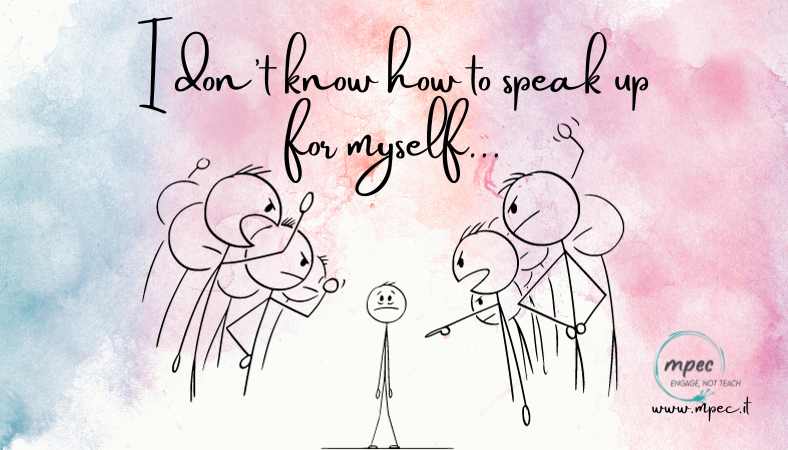Benvenuti alla nostra discussione illuminante ispirata dai TED Talks! L’argomento di oggi è sia impegnativo che essenziale: “Perché Parlare Apertamente Di Quello Che Pensiamo o Difenderci Può Essere una Sfida?” In questa sessione, esploreremo i vari aspetti che rendono difficile l’auto-rappresentazione, dai contesti culturali alle paure personali. Questa è un’occasione per comprendere le barriere alla comunicazione assertiva e imparare come possiamo superarle. Immergiamoci nell’arte di trovare la nostra voce e usarla efficacemente
Prepared for you by: My Personal English Coach
Non sai da dove iniziare?
Not sure where to start?
Round 1: Understanding the Challenge
- “Have you ever held back from speaking your mind in a crucial moment? What stopped you?” ( hold back means to not do something, often because of fear or because you do not want to make a bad situation worse)
- “In what situations do you find it hardest to speak up for yourself?” (speak up for someone/something = to support someone or something, especially by saying good things about him, her, or it: She has often spoken up for the rights of working mothers.)
Key Grammar/Vocabulary Expressions:
- Hesitate (e.g., “I hesitate to say…”)
- Self-doubt (e.g., “Self-doubt often holds me back…”)
- Cultural influences (e.g., “Cultural influences sometimes dictate…”)
- Assertive vs. aggressive (e.g., “There’s a fine line between being assertive and aggressive…”)


Round 2: Overcoming Barriers
- “What strategies do you use to overcome fear or anxiety when speaking up?”
- “Can you share a time when you successfully advocated for yourself? What made it successful?”
Key Grammar/Vocabulary Expressions:
- Overcome (e.g., “To overcome my fear, I…”)
- Empowerment (e.g., “Feeling empowered, I…”)
- Confidence building (e.g., “Building confidence is key to…”)
- Voice your thoughts (e.g., “Voicing my thoughts helps me…”)
Round 3: Learning from Others
- “Are there public figures or TED speakers who inspire you to speak up? What about them inspires you?”
- “How can we learn from others’ experiences in speaking up for themselves?”
Key Grammar/Vocabulary Expressions:
- Inspiration (e.g., “I find inspiration in…”)
- Role models (e.g., “My role model in assertiveness is…”)
- Learning from (e.g., “Learning from others, I…”)
- Influential speakers (e.g., “Influential speakers like… have taught me…”)

Remember – there is always more! Here is your Follow Up Video:
#SpeakUp #SelfAdvocacy #TEDTalks #CommunicationSkills #PersonalDevelopment #Assertiveness #ConfidenceBuilding #PublicSpeaking #VoiceYourOpinion #Empowerment #OvercomingFears #AssertiveCommunication #SelfExpression #EffectiveCommunication #PersonalGrowth #SelfConfidence #FacingChallenges #TEDInspiration #AssertivenessTraining #FindingYourVoice
#ParlareApertamente #AutoRappresentazione #TEDTalks #CompetenzeComunicative #SviluppoPersonale #EssereAssertivi #CostruzioneDellaFiducia #ParlareInPubblico #EsprimiLaTuaOpinione #Empowerment #SuperareLePaure #ComunicazioneAssertiva #Autoespressione #ComunicazioneEfficace #CrescitaPersonale #Autostima #AffrontareSfide #IspirazioneTED #FormazioneSullAssertività #TrovareLaPropriaVoce







